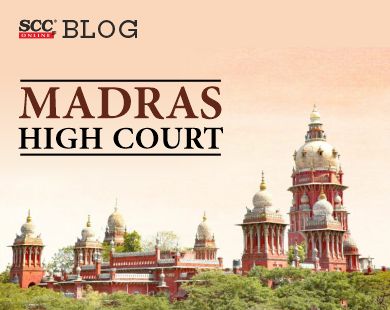Madras High Court: In a writ petition filed against the order passed by the Madurai District Differently Abled Welfare Officer (‘welfare officer’), praying for quashing the same and to direct the respondents to appoint the petitioner as a lawful guardian of his sister, who was mentally challenged person, G.R. Swaminathan, J. held that the petitioner’s sister suffers from ‘benchmark disability’ i.e. a person with not less than forty percent of a specified disability under the Persons with Disabilities Act, 2016 and directed the District Collector to appoint the petitioner as her legal guardian.
Facts
The petitioner’s sister suffers from chronic schizophrenia, diagnosed by certified medical professionals. She is dependent on her family and the welfare Office had verified this.
The petitioner applied before the respondents for appointing him as legal guardian of the sister, which was promptly rejected by them on the grounds of absence of any such provision under the National Trust for Welfare of Persons with Autism, Cerebral Palsy, Mental Retardation and Multiple Disabilities Act, 1999 (‘Act, 1999’).
Issues (I) Whether petitioner can be appointed as legal guardian for his schizophrenic sister under Section 14 of Act, 1999?
(II) Whether the writ petition for challenging rejection order should be allowed, especially in absence of any provision for appointing legal guardian for a person with mental illness under the 1999 Act?
(III) Whether schizophrenia is included under the various heads of mental disabilities (severe, benchmark, multiple, specified etc.) under both Acts?
Decision and Analysis The Court took note of Section 14 of the Act, 1999 and noted that the aforesaid provision provides for appointment of guardian for a “person with disability” Further, it examined the definition of “person with disability” given under Section 2(j) of the 1999 Act, and said that the definition consists of two parts, The first part specifies what the expression “person with disability” means. The second part states what is included.
Further, it took note of Section 2 of the Person with Disabilities (Equal Opportunities, Protection of Rights and Full Participation) Act, 1995 (‘Act, 1995’), which had been repealed by Section 102 of the Rights of Persons with Disabilities Act, 2016 (‘Act, 2016’).
The Court concluded that mental illness has been classified as a disability both under the 1995 Act as well as the 2016 Act.
The Court said that the institutional framework laid down in 1999 Act is not confined only to persons with autism, cerebral palsy, and mental retardation. The aforesaid disabilities are congenital in nature.
Further, it said that the understanding of the authorities that the 1999 Act is not meant to deal with acquired disabilities is incorrect because the second part of the definitional clause in Section 2(j) of the 1999 Act encompasses persons suffering from multiple disabilities.
Thus, it viewed that mental illness ought not to be kept out of the scope of the 1999 Act.
The Court also said that, though Section 2(h) of the 1999 Act talks of combination of two or more disabilities as defined in Section 2(i) of the 1995 Act, the first five categories set out therein do not really necessitate appointment of guardian. The sixth category, namely, mental retardation is dealt with in the 1999 Act. Thus, only the category of mental illness is left, which cannot be combined with one or more of the first five categories. This is because guardianship is required only because of the condition of mental illness.
Further, after taking note of 2019 SCC OnLine Kerala 739 (Shobha Gopalakrishnan v. State of Kerala) wherein the Court after invoking parens patriae jurisdiction and Article 226 of the Constitution of India said that in cases involving persons in comatose condition, the High Court can appoint guardians. However, the principles set out in the National Trust Act, 1999 shall be borne in mind. Further, it laid down a set of guidelines for the same, till proper legislation is not there.
The Court said that there are different standards and varying principles of interpretation. Some provisions require strict interpretation and some demand liberal and expansive interpretation. Usually, the language of the statute is construed as such without leaving out any part. But at times, in order to advance the legislative object, certain words may have to be glossed over, like a conjunctive word “and” is read as “or”.
Further, it said that while dealing with emancipatory statutes, the Court will be guided only by the principles of purposive interpretation. Adopting such an approach, the expression “person suffering from multiple disability” occurring in Section 2 (j) of the 1999 Act must be understood to mean “a person with benchmark disability” as defined in Section 2(r) of the 2016 Act
The Court opined that Local Level Committee should not confine themselves to cases of congenital conditions, and should also deal with other disabilities.The 1999 Act should be applied in the light of the new 2016 Act and not in the light of the repealed 1995 Act, because it is easier to secure appointment of guardianship under the 1999 Act. Thus, if the Local Level Committee under the 1999 Act has the power to appoint guardian, it would enable easier and quicker access to justice.
The Court noted that the petitioner’s sister is suffering from 60% disability. As per the definition in the 1999 Act, only if the person is suffering with more than 80% disability, it will come under the severe category. However, the concept of severe disability has been given up in the 2016 Act.
The Court said that materials on record clearly indicate that the petitioner’s sister is suffering from benchmark disability. Thus, held that a guardian must be appointed for her.
[G. Babu v. District Collector, Madurai, 2023 SCC OnLine Mad 568, decided on 24-01-2023]
Judgment by: Justice G.R. Swaminathan Advocates in appearance:
Advocates who appeared in this case :
For Petitioner- AdvocateS. Muniyandi;
For Respondents: Special Government Pleader. K. Balasubramaniam.







